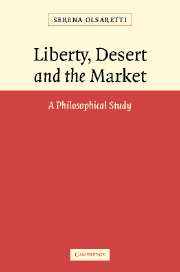Book contents
- Frontmatter
- Contents
- Acknowledgements
- Introduction
- 1 Desert and justifications of the market
- 2 Incentive payments and compensatory desert
- 3 Productive contributions and deserved market rewards
- 4 Liberty and entitlements in the libertarian justification of the free market
- 5 The moralised defence of the free market: a critique
- 6 The free market, force and choice: beyond libertarians and their critics
- Conclusions
- Bibliography
- Index
4 - Liberty and entitlements in the libertarian justification of the free market
Published online by Cambridge University Press: 22 September 2009
- Frontmatter
- Contents
- Acknowledgements
- Introduction
- 1 Desert and justifications of the market
- 2 Incentive payments and compensatory desert
- 3 Productive contributions and deserved market rewards
- 4 Liberty and entitlements in the libertarian justification of the free market
- 5 The moralised defence of the free market: a critique
- 6 The free market, force and choice: beyond libertarians and their critics
- Conclusions
- Bibliography
- Index
Summary
FROM DESERT TO ENTITLEMENT AS GROUNDS FOR JUSTIFYING FREE MARKET OUTCOMES
The defence of the market, says Jan Narveson, is the first, if not the only, thing on the libertarian agenda. However, he goes on to add, to defend some market activity is trivial: libertarians aim at justifying no less than a full market society. This ambitious libertarian project, to which I now turn, may seem to be more likely to succeed in providing a justification of free market outcomes than the desert-based arguments I have examined so far. By resting their case for the justice of free markets on the appeal to a substantive principle of justice, desert-based arguments must show that a distribution of rewards matches a pattern or distribution of deserts. This, as I have shown, raises serious problems where the distribution of rewards is one generated by the free market, since a market-generated distribution of rewards is deeply and pervasively influenced by the effects of luck, so that it is unlikely to match a distribution of differential deserts. I have also shown that attempts at overcoming this problem and trying to render desert compatible with luck stretch the notion of desert in an indefensible way.
None of these difficulties seem to beset libertarian arguments for the free market. These are entitlement-based, that is, they set out to justify the free market by appealing to antecedently established entitlements of individuals, the market being the process whereby these rights are exchanged without being infringed.
- Type
- Chapter
- Information
- Liberty, Desert and the MarketA Philosophical Study, pp. 86 - 108Publisher: Cambridge University PressPrint publication year: 2004



